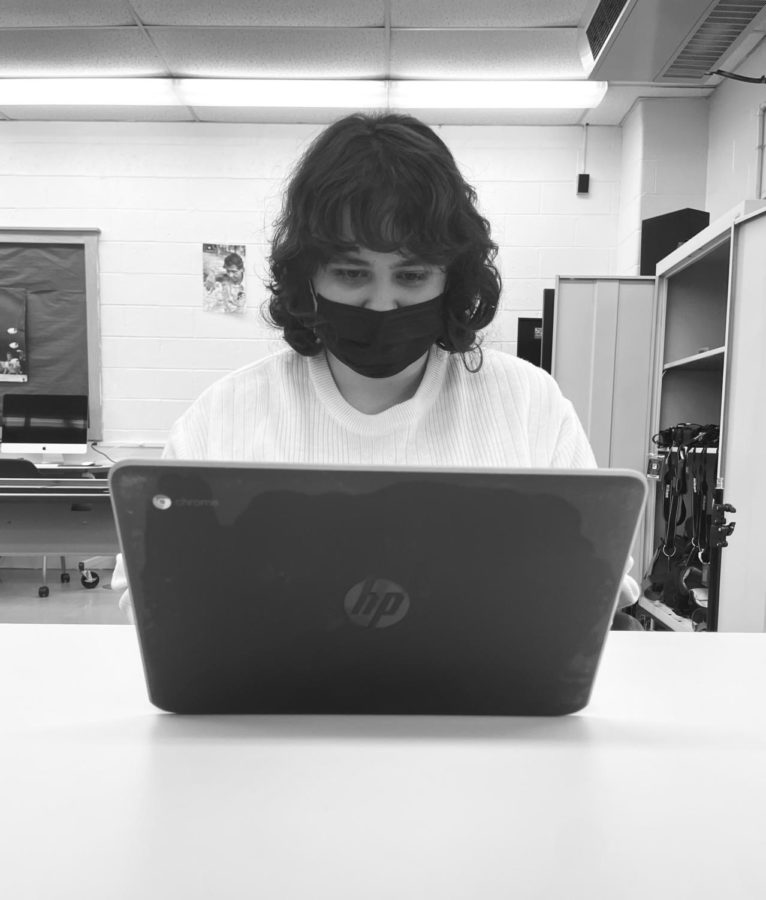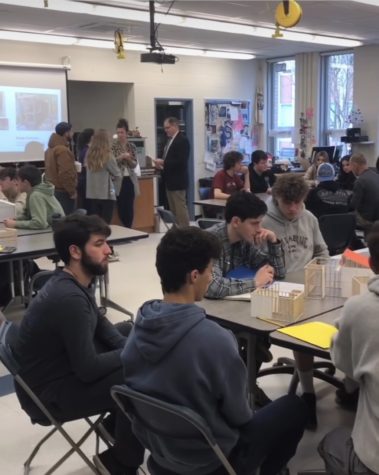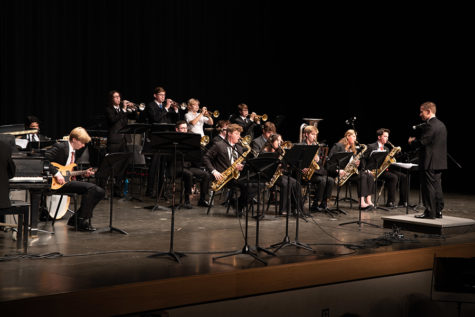Chromebooks: Are They Really Necessary?
December 3, 2021
Chromebooks, small laptops in grey cases should be familiar to every student at Shawnee Highschool. Initially stored in carts, Chromebooks were shared between classrooms and were only used when teachers couldn’t get a spot in the computer lab. In March of 2020, Shawnee High school went into lockdown due to the Covid-19 pandemic.
Chromebooks were sent home with students who did not have computers at home. Initially, this introduction of Chromebook laptops did not seem to be a permanent fixture in the lives of students at Shawnee. However, the pandemic became a more serious problem, and schools had to remain closed for the rest of the year. At the start of the 2020-2021 school year, students were introduced to a hybrid schedule, or they could remain fully virtual.
Distributed to each student, Chromebooks ensured that everyone had access to technology. As Covid-19 can live on paper, the school found that it would be more sanitary if everyone relied on virtual resources. Chromebooks were used daily inside and outside of class throughout the 2020-2021 school year.
At the start of the 2021-2022 school year, students were informed that Chromebooks were still an aspect of their learning experience. Everyone was given a Chromebook, even though virtual learning would not be implemented. As of now, Chromebooks seem to be a permanent fixture at Shawnee Highschool and at other public schools.
The effect Chromebooks have had on the lives of students and staff should be considered. Every department of Shawnee High School has been impacted by the addition of Chromebooks. However, people are divided into the positives and negatives of these devices. Many students dislike Chromebooks, wanting to return to a pencil and paper learning environment. Other students enjoy the efficiency and simple organization of the Chromebooks.
Many people find that learning on paper is better for memorization and creativity. Studies were done at Princeton University and UCLA show that students who took their notes on paper learned more than students who took their notes on computers. Although students who wrote on computers were able to take more notes, they retained far less information.
Upon consulting some of my peers, Abbie, Leah, and Ally, about their opinions on Chromebook usage at school, I gathered a lot of information.
Z: How have Chromebooks changed the way that you learn?:
Abbie: I feel like when teachers give assignments that are on the Chromebook, it makes it more difficult for me to process what is being taught because I feel that I and most people learn better when we have physical copies.
Ally: There has been a lot less paper. Taking notes has become harder. I miss the feeling of paper, despite the paper shortage. I believe that Chromebooks have helped teachers through the paper shortage and through virtual learning.
Though my peers felt that Chromebooks had done more harm than benefit, Chromebooks are also found to hold some benefits. Chromebooks allow students to collaborate with one another, without having to be physically present. This can allow students to work on group projects from home, even if they don’t have access to their own computer. Students who prefer to keep all of their work to be organized digitally also benefit from Chromebooks, as they no longer have to deal with the same amount of clutter and loose paper.
I consulted Mrs. Rosemary Johnson, Shawnee’s Media Center Specialist, on how Chromebooks affect her job, and her opinion on them. Here is what she had to say:
Z: How has the introduction of Chromebooks changed your job?
RJ: From an overall job responsibility standpoint, the introduction of Chromebooks has drastically changed my job. In addition to my traditional Media Specialist/Librarian duties (such as collection development, database management, teaching research skills and effective/efficient use of information, book recommendations, etc.), I now support the teaching and technology staff in making sure our students are online and ready for class. I receive emails 24/7 when there are problems and do my best to help solve them. We loan out Chromebooks to students who may have forgotten theirs on any given school day, troubleshoot hardware and software problems, change passwords, keep accurate records for asset management purposes (e.g. who has which Chromebook), and help in the distribution and collection process at the beginning and end of the school year. I have learned more about Chromebooks and technology in the past few years than I ever thought I would!
Z: Do Chromebooks cause you any unnecessary problems?
RJ: I think the biggest problem we have with the Chromebooks is when they don’t work when we need them to work. The Chromebooks can be quirky and we’ve learned some tricks to help us to work with them. It is frustrating for staff and students when we can’t log on or zoom or connect to the wifi, the mousepad and keys aren’t working correctly or we can’t find the apps/software we need. It can be very exasperating when we are trying to get things done. Sometimes we need to recognize that we are maybe expecting the Chromebooks to do things beyond what they were intended to do. Luckily we now have some experience with these common problems and they can be solved fairly quickly with a little help and patience!
Z: Do Chromebooks offer any clear benefits?
RJ: I cannot imagine how we would have navigated the pandemic had it not been for the fact that our students and staff all had Chromebooks. Not very long ago, we would not have been able to accomplish from an education standpoint what we did during the pandemic without each student and staff member having online access to things like Google Classroom and Meet or ebooks. The Chromebooks may not be the perfect solution, but they give us all access to conduct classes, interact and stay connected (even when we could not be face-to-face in person), and at the start of the pandemic we were able to get up and running on a very short timeline. There has been a steep learning curve for all of us, but we have adapted and made the best of it. We should all be proud! As a Media Specialist, having each of our students have a Chromebook post-pandemic means that I can go into the classroom to deliver lessons – students do not necessarily need to be in the library to access online resources from anywhere (even home) and learning can continue. We have the flexibility to work outside the traditional classroom set-up – either in groups, independently, or remotely – which gives us more access to information. Personally, I have been able to attend lectures or meetings on topics that I am interested in because I was able to attend remotely right from my desk – something I could not have done in the past. The Chromebooks have also allowed us to incorporate new applications and software into our lessons and have encouraged students to develop and improve their self-learning skills as well as their ability to collaborate on projects. Collaboration and accountability have been the biggest benefits in my opinion.
Z: Do Chromebooks cause any clear problems?
RJ: We need to remember that Chromebooks are merely a tool – it is what we do with that tool that makes the difference. I think with a little creativity and patience, we can overcome almost any problem. For some students and many school districts, getting a Chromebook into every student’s hand has leveled the playing field. It is when we have students who do not have access to these tools while others do that we see problems and inequities.
Z: What are any other thoughts you have on Chromebooks?
RJ: We are still at the beginning stages of using Chromebooks and the associated tools/software/apps in education. The use of technology in the classroom gives us the opportunity to learn outside of the textbook and interact with information in other ways that may be better suited for different types of learners. It will be interesting to see what the future holds and how things will change going forward.
Mrs. Johnson’s detailed account of her experience with Chromebooks has brought up several good points about the direction education is progressing toward today.
When considering the future of education, Chromebooks seem to be here to stay. Each student is in possession of a Chromebook, teachers are actively using google classroom, which is where most assignments are posted online, and online learning has been incorporated into the curriculum. In today’s uncertain society, it will be difficult to predict the longevity of the Chromebook. Is it a passing trend, or a necessary feature in today’s classroom environment?








